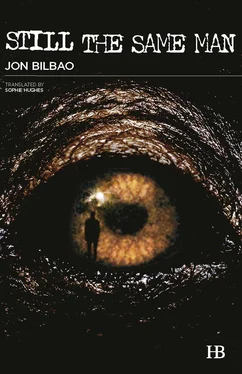But as the years went by, his friend became more and more distrustful and distant. He avoided Joanes outside work hours. He assigned himself all the business trips, as if he wanted to spend as little time as possible in the office. Things went on like this until, one day, he revealed his plan to up sticks and move to a bigger city. He offered his part of the business to Joanes, who could either take it over entirely or risk someone else buying it, someone he might not get along with as well. He talked it through with his wife, and the two of them together opted for the former. They dipped into their house savings, and Joanes, once again, asked his dad for help.
Suddenly he owned one hundred percent of the business.
And then things took a turn for the worse. The jobs began to dry up, as if his ex-partner had been the only one the clients trusted. The formerly profitable business was being run into the ground, and in a matter of months it was on the cusp of insolvency. Joanes began to think that perhaps he’d had nothing to do with its previous success, that it had all been thanks to his ex-partner. Now that he, and he alone, was at the helm, the whole thing was falling apart. None of his efforts came to anything, just as had happened at the telephone cable company.
Over all those years, he’d never forgotten his visit to see the professor, but when the company began to go from bad to worse, the memory came back on a daily basis to haunt him. He no longer wondered what the professor had seen in him to discourage his hiring at Robot Systems; the problem was perfectly clear from the way everything had gone for him since. Now he asked himself how the professor had managed to see it, how he’d come by his power of prescience. And he asked himself, too, if during the little time that they’d spent there on that balcony, from the few words that they’d exchanged, the professor had perceived anything more than a bleak professional future.
The nights he couldn’t sleep, when all those thoughts came into his head, spinning in an endless spiral, his self-respect kicked in as a kind of defense mechanism.
Accurate as the professor’s intuition might have been, it didn’t allow him to see into the future. If he hadn’t recommended Joanes for Robot Systems, perhaps it was because he wanted the post for some family member or friend, or perhaps for an even more banal reason, like, for instance, him not liking some physical feature of Joanes’s or because of the geographical implications of his last name.
But not even this idea offered him any relief, because beyond any of the possible reasons the professor might have had at the time, Joanes, and Joanes alone, was responsible for his pitiful career.
And a second later he’d tell himself no, that he couldn’t be the only one responsible. That there must be someone else to blame, someone to share some of the responsibility. And his old don fitted the bill just perfectly.
And in this way the professor became the virtual stooge for Joanes’s problems. During their brief encounter on the balcony, he hadn’t merely foreseen the unfortunate future that lay in store for the boy who’d once been his student; he — the professor — had provoked it. For whatever reason, he had condemned him in some way, cursed him.
Joanes let himself think this way. And in time he came to believe it. The professor became a vessel for all his frustrations and rage. And the vessel gradually filled up, and its contents grew more and more viscous, until eventually they became as hard as stone; the professor was no longer a mere emotional device, a fantasy for self-exoneration, he’d become the one true culprit of everything bad that had ever happened to Joanes.
The room measured four by five feet. While it had seemed big enough at first, now it gave Joanes the impression that there was barely space to move. He stood waiting, unsure what to do. The professor was sitting in the only available seat, which he’d put next to the bed where his wife was resting. She’d changed into a pale pink dress, as much like a hospital gown as the previous one. She looked a little better. Her husband had helped her freshen up. On the floor there was a washbowl with soapy water and a sponge inside. The professor had also gotten ahold of a pillow, and his wife was resting, her head upright, against it.
“That strange girl, the owner’s daughter, came by,” said the professor. “She put the hammock up.”
Joanes would have more than happily thrown himself into the hammock, but he rejected the idea; the stance would have seemed too indolent, insulting even, given the circumstances. Instead of lying down, he went over to the window and remained there, on his feet. Apart from the chair where the professor was sitting, there was just one other seat — the wheelchair. He didn’t even entertain the idea.
“How are you doing?” he asked the woman.
She cocked her head in a gesture that could have meant anything.
The professor was holding a damp handkerchief, which every now and then he used to cool her forehead. His face betrayed no emotion whatsoever. He wore the same vacant expression he used to in class when he would fall suddenly into one of his absorbed silences. If someone had asked Joanes what the professor might be feeling, he’d have said “exhaustion” or “anger” long before “concern.”
A few minutes later, his wife began to make fitful snoring sounds, and the professor got to his feet, taking care not to wake her. He moved over to the window. Joanes and he both looked out.
Up in the sky, the black silhouettes of a few vast birds traced out circles around a single point in the undergrowth.
“There’s something out there in agony, or something dying,” said the professor, almost in a whisper. “Did you know that in ancient Egypt it was a commonly held belief that there were no male buzzards, only females? And that when the time came to reproduce, these females would simply expose their vaginas to the wind?”
After a meditative pause he added, “It’s not a bad method. Pretty agreeable, if you ask me. Avoids unnecessary ties.”
Joanes considered this affected, erudite, and ultimately useless statement as the kind of thing the professor would come out with when he wanted to assert his superiority over the students.
“They’re not buzzards, they’re black vultures,” he said.
“Isn’t that the same thing?”
“I believe not.”
The professor watched the birds keenly, squinting his eyes.
“Buzzards, black vultures. . it’s all the same.”
He went on, “You’re lucky your family isn’t here.”
Joanes conceded the point.
“I’m glad they don’t have to spend the night in this place,” he said.
“That’s not what I mean. I mean that you’re lucky. You’re not dependent on anybody, and nobody’s dependent on you.”
Joanes nodded in agreement. Then he said, “You’re right.”
“Are your wife and daughter alone?”
“No. My father-in-law’s with them.”
“Even more reason to feel lucky. He’ll look after them.”
Joanes imagined his wife and daughter under the care of his father-in-law and felt a mixture of relief and remorse. It also occurred to him in that same moment how alike the professor and his father-in-law were, in various ways.
“I’m going to keep hunting for a telephone,” said the professor. “In all likelihood, the wind will blow some telephone tower down soon, and then I’ll have no way of calling. Would you mind staying with her?” he asked, gesturing toward his wife.
“Of course not.”
The professor left the door ajar on his way out, to let some air into the stifling room. A couple of kids were chasing each other up and down the hallway. Every time they passed the room, they would stop and look inside, grinning. When they appeared for the umpteenth time, the professor’s wife opened her eyes and, in a reedy whisper, asked Joanes if he could close the door. He did as she asked.
Читать дальше












